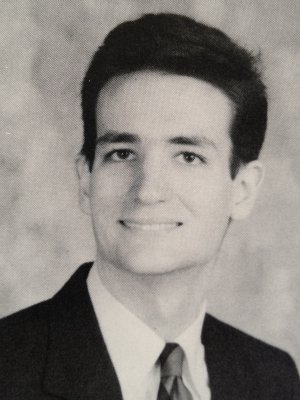
People simply cannot get enough Ted Cruz these days.
The Senator, one of two representing the state of Texas, perennial hotbed of Presidential candidates successful and otherwise, recently became the first official candidate to take the office of the Presidency in 2017. He’s also one of two Senators representing the American Parliamentary Debate Association (APDA), the hyper-competitive debate league on which I competed for four years and coached for five. Chris Coons (D-CT) is the other, a former teammate of David Foster Wallace, who he described in the latter’s recent biography as having “literally the worst delivery I have ever heard.”
A huge portion of my circle of friends has been following the rise of Cruz as a model for what APDA debaters can become, though few share his particular ideology. But the increasing question, raised by some of even his teammates and former friends, is whether he shares his particular ideology. As a passionate spokesman for rabid conservatism to the point of alienating many Republicans, Cruz has always been a polarizing figure. But he’s also, at root, a debater, making him capable of employing passionate and rabble-rousing rhetoric without necessarily believing it personally. Could this all be an elaborate troll?
The question of whether a serious candidate for the President of the United States is just trolling us with his beliefs may sound far-fetched, but you have to understand the world of APDA debate. There are many things that I love about the debate circuit as a culture and debate as a format for learning and skills development, but there are also a ton of things that disappoint. Two quick reference points for an introduction might be the Judging Bias Report, just released today by the Women’s Initiative, and the beloved Slate piece on Ted Cruz’s time on the circuit and in college. After the latter article made the rounds in August 2013, a former colleague of Cruz’s on the circuit posted on a Facebook thread that he didn’t think Ted Cruz believed a word of what he said – he just wanted to have the power, influence, and prestige that come with political position.
When I joined the Brandeis debate team, the team President at the time (whose name I won’t disclose since I’m not trying to use this space to impugn his character for Google) was an abrasive, egotistical leader with a true gift for public speaking. He was intimidating, off-putting, and sometimes corrupt, but also served as a mentor for me and personally vested time and energy into my improvement. He had a very successful debate career indeed, taking Brandeis to the National finals and winning top speaker at that tournament, and went on to Yale Law School as expected. Then, quite suddenly, he was born again and became a devout evangelical Christian. He disavowed his prior habits, like getting high with friends and mockingly reading passages of the Bible aloud for amusement, becoming suddenly quite interested in the fate of everyone’s soul. He kept his Wiccan wife, though I wasn’t close enough to them at the time to know whether she converted also, and soon entered seminary. Most all of his friends were baffled and even more questioned the sincerity of this conversion.
My assumption is that he was doing it for political gain. He had desired high political office since birth near as I could tell, but he had openly expressed fear that his Jewish heritage would put a cap on the trajectory of his ascent in America. A sincere-seeming conversion, vouched for by his friends, is certainly far less compromising and transformative than much of what people go through to get ahead in the arena of US politics. By this point, he’d unfriended me from Facebook and we hadn’t spoken in years, so I was never able to do personal investigation. It’s possible that he really means it and that I’m to be criticized for questioning his sincerity. But the consensus of those who spent the most time with him in those years on APDA is that this was just another in a series of shrewd political calculations with the goal of rising to the top.
And herein lies one of the critical problems with APDA, though it’s hardly exclusive to said circuit. It makes rising to the top and end in itself. Ideally, our politicians would seek office in the old-fashioned ideal of the notion – to serve the people, or at least to work for an ideal or a set of principles. To have a goal, an achievement or a belief structure in mind, and then set about acquiring the power necessary to enact such ideals. In the brief fanciful moments wherein I entertain the idea of an America where I’d be electable (despite a long history of criticizing the country, its history, and its current policies), it is this kind of candidacy that I envision: stumping for pacifism, equality, and the maintenance society. I won’t say that there’s no thrill in the idea of being a personage, of having fame and influence, but it’s pretty much all desirous as a means to an ends of making the world a more moral place that takes better care of its people.
No one really thinks this is what Ted Cruz is after. Not among those who knew him best back in the day, and certainly not even in those who follow him now. Like so many people, he wants to be President to be President. And unfortunately, there’s probably something about APDA that trains people to think this way. The place is an elite and competitive crucible of some of the brightest young minds in the country, replete with anger, egos, entitlement, and various pressures to win at any cost. Tons of otherwise civilized and reasonable people become transformed into cutthroat competitors in the refraction of this forge, running unfair cases against close friends and even lovers, employing vitriol and ridicule to shame their opponents, even resorting to bald appeals to their superior reputation as being deserving of victory. It’s not that everyone does this, or that anyone does this all the time, but APDA is such a purely intellectual playground that is so insular and self-promotional that the stakes of any given round or tournament can sometimes feel like life and death. Or, perhaps, like the Presidency itself.
The background of APDA’s top competition, be it the wealthy establishment or mere intellectual brilliance or rhetorical firepower, bolsters the notion that what’s happening week to week at any tournament truly matters. This is a circuit that annually asks a series of “Family Feud” style questions about itself and the topic of “Most likely to be President” is taken seriously as an actual prediction of future success. The Ivy League is well represented and has often dominated APDA competition, but upstart schools like Brandeis or Rutgers or Boston University have enjoyed great success as so many of APDA’s alumni have gone on to fame, fortune, or preparation to make influential decisions for the country. Whether there’s something about a competitive debate league that makes one more likely to lead in the future is uncertain but likely. Whether there’s something about this debate league in particular that leads people to pursue success for its own sake using the tools acquired on the circuit is pretty definite.
Any debate format where one doesn’t get to choose what one is defending or advocating all the time is going to force people to be more open-minded and, sometimes, insincere in using fiery rhetoric to express beliefs one disagrees with. I was disheartened after a public demonstration round my senior year when a novice told me that I’d convinced him of the morality of the draft, something I disagree with so vehemently that I’d refused to register for the Selective Service and nearly lost my financial aid and ability to go to college over it. But the opposing team had thought it would be cute to make me defend my nemesis system in front of a couple hundred new debaters and I convinced at least one to join the side I was defending, at the peril of what I think is right. Admittedly, I think this practice is still incredibly valuable as an intellectual exercise and learning tool, but it was hard on that day to not feel like I was undermining something fundamental about what I believe.
The hubris that accompanies APDA is also worth noting here, fueling the habit of people who ruthlessly pursue power for the sake of lording it over others. Note that said demonstration round described above was held on September 14, 2001 in New York City, at the opening tournament of the year, a tournament designated for first-year debaters who had just had their college experience defined by 9/11. Despite the assumption that there would be more attacks in the US and soon, APDA decided to hold this tournament a few miles from Ground Zero, three days after the event, because not doing so would be “letting the terrorists win.” With a background like this, it’s not hard to see where Ted Cruz comes from.
So does he mean it? Does he really want to enact the policies he claims? Or is he just another debater in pursuit of a slightly different kind of National Championship, one who revels in the thrill of the competition and the bravado of intellectual battle?
You’d have to ask the people closest to him at the time. I feel confident I could speak to a good deal of the motives and backgrounds of debaters on the circuit from 1998-2015, but Cruz graduated in 1992 and I never saw him speak. Never even met the guy, though he came back and judged during at least one tournament during my tenure. And hey, people change. Maybe he became convinced that Bible-thumping conservative doctrine is what the country truly needs. But my guess is you can take the kid out of APDA, but you can’t really take APDA out of the kid. The White House is an awfully shiny trophy and it’s hard to argue with that kind of hardware.


